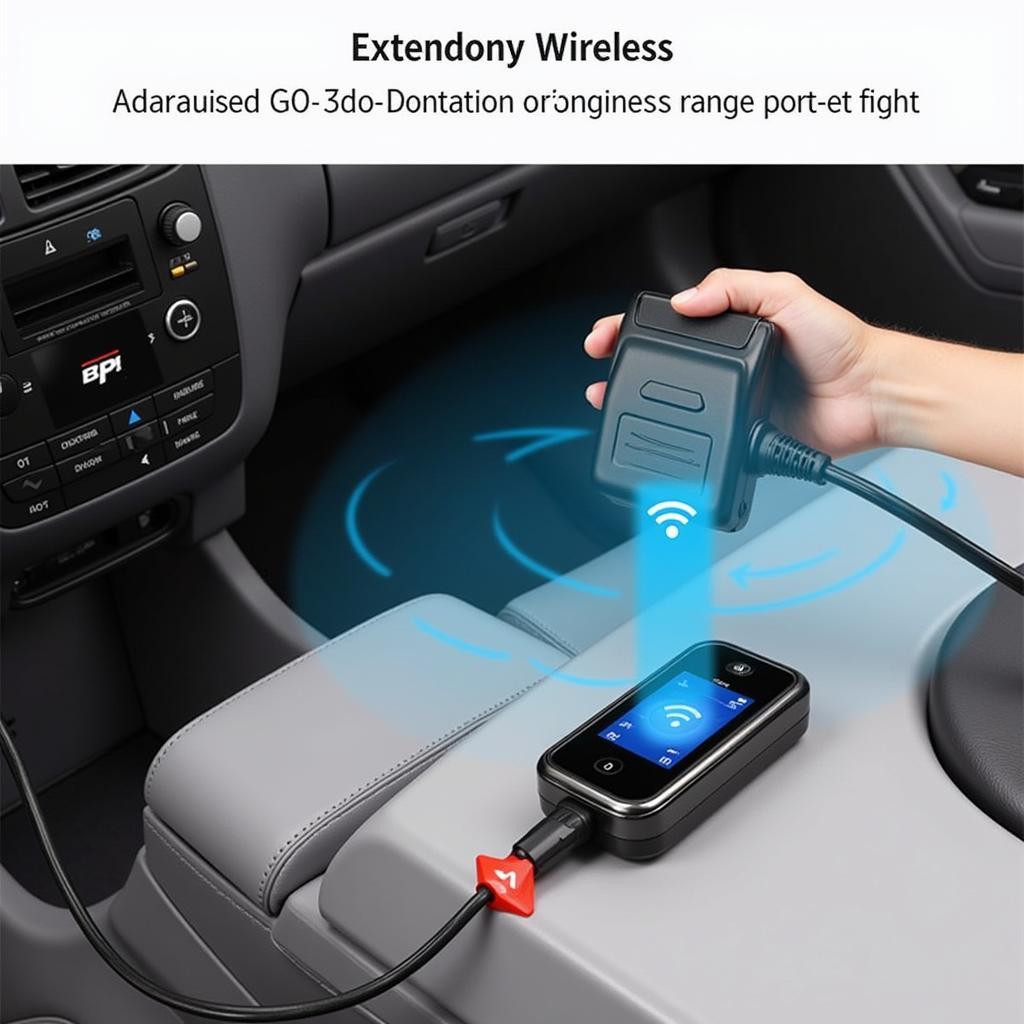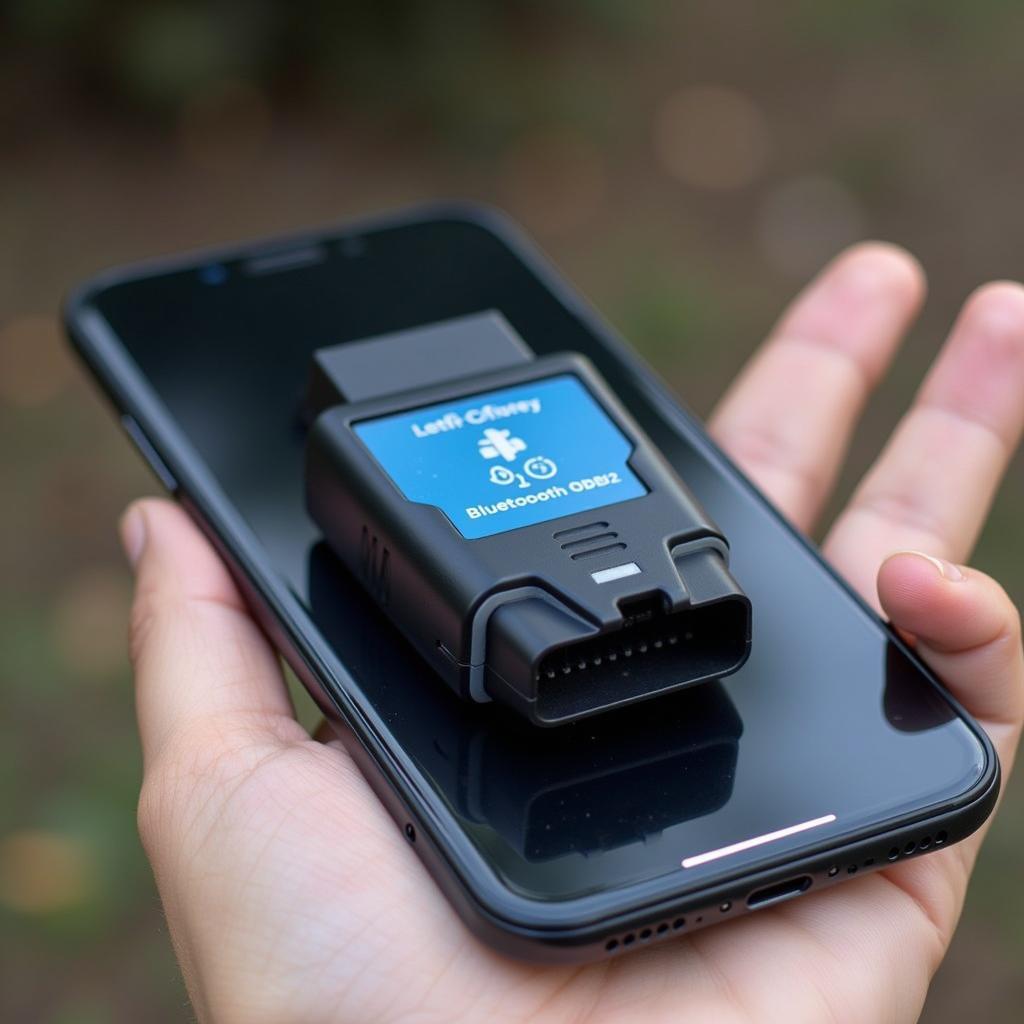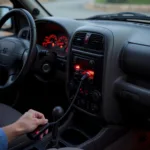Shopping for an OBD2 scanner can feel like navigating a maze of technical jargon and confusing specs. One of the first hurdles you’ll encounter is deciding between a WiFi OBD2 scanner and a Bluetooth OBD2 scanner. Both offer a wireless connection to your smartphone or tablet, giving you the power to diagnose engine trouble codes, monitor live data, and even customize your car’s performance. But how do you know which type is the best fit for your needs?
This comprehensive guide will delve into the world of WiFi and Bluetooth OBD2 scanners, exploring their pros and cons, key features, and ideal use cases. By the end, you’ll be equipped with the knowledge to make an informed decision and find the perfect scanner to unlock your inner mechanic.
Understanding the Basics: How OBD2 Scanners Work
Before we dive into the specifics of WiFi and Bluetooth scanners, let’s briefly review the basics of OBD2 technology. OBD2 stands for On-Board Diagnostics, generation two, and it’s a standardized system found in most vehicles manufactured after 1996. Your car’s OBD2 port acts as a communication hub, constantly collecting data from various sensors located throughout the engine and other critical systems.
An OBD2 scanner plugs into this port and acts as a translator, allowing you to access and understand the wealth of information stored within your car’s computer. Traditionally, OBD2 scanners were bulky handheld devices with built-in screens. However, with the advent of WiFi and Bluetooth technology, compact and affordable wireless scanners have taken center stage, offering greater convenience and flexibility.
WiFi OBD2 Scanners: Your Networked Diagnostic Powerhouse
WiFi OBD2 scanners create their own wireless network, allowing your smartphone or tablet to connect directly to the scanner. This creates a dedicated connection that’s less susceptible to interference from other devices in the vicinity.
Pros:
- Extended Range: WiFi scanners typically boast a longer range compared to their Bluetooth counterparts, making them ideal for use in garages, workshops, or even short-range diagnostics while driving.
- Stronger Signal: The dedicated network created by WiFi scanners offers a more stable and reliable connection, minimizing data dropouts during diagnostics.
- Multiple Device Connectivity: Some WiFi OBD2 scanners allow multiple devices to connect simultaneously, enabling real-time data sharing and collaborative diagnostics.
Cons:
- Setup Complexity: Setting up a WiFi OBD2 scanner can be slightly more involved than Bluetooth, as it often requires configuring your device to connect to the scanner’s network.
- Power Consumption: Since they create their own network, WiFi scanners tend to consume more power, potentially draining your car’s battery faster during prolonged use.
Ideal Use Cases:
- Professional mechanics and technicians working in garages or workshops
- Diagnosing complex or intermittent issues that require a stable connection
- Situations where multiple users need to access diagnostic data simultaneously
Bluetooth OBD2 Scanners: Pocket-Sized Convenience at Your Fingertips
Bluetooth OBD2 scanners pair with your smartphone or tablet just like any other Bluetooth device, offering unparalleled convenience and portability.
Pros:
- Easy Setup: Pairing a Bluetooth OBD2 scanner is usually as simple as searching for available Bluetooth devices on your smartphone and selecting the scanner.
- Wide Compatibility: Most smartphones and tablets come equipped with Bluetooth, making Bluetooth OBD2 scanners highly compatible with a wide range of devices.
- Low Power Consumption: Bluetooth Low Energy (BLE) technology ensures minimal power consumption, making it a battery-friendly option for both your scanner and device.
Cons:
- Limited Range: Bluetooth scanners have a shorter range than WiFi scanners, typically around 30 feet. This can be limiting in some professional settings or when diagnosing issues outdoors.
- Potential Interference: Bluetooth signals can be prone to interference from other nearby devices using the same frequency, potentially causing connection instability.
Ideal Use Cases:
- Everyday car owners looking for a quick and easy way to check engine codes
- Casual DIY mechanics working on personal vehicles in their garage
- Monitoring live vehicle data while driving (within the limited range)
Choosing the Right Scanner: Factors to Consider
Now that you understand the key differences between WiFi and Bluetooth OBD2 scanners, let’s explore some crucial factors to help you make the right choice:
- Your Budget: Bluetooth OBD2 scanners are generally more affordable than their WiFi counterparts.
- Technical Expertise: If you’re new to car diagnostics, a Bluetooth OBD2 scanner’s plug-and-play simplicity might be more appealing.
- Diagnostic Needs: For basic code reading and data monitoring, a Bluetooth scanner will suffice. However, professional-grade diagnostics often benefit from the stability and range of a WiFi scanner.
- Device Compatibility: Ensure that the chosen scanner is compatible with your smartphone or tablet’s operating system and Bluetooth version.
Beyond Connectivity: Exploring Essential OBD2 Scanner Features
While connectivity is a crucial consideration, several other factors can influence your OBD2 scanner selection:
- Software Features: The software accompanying your OBD2 scanner plays a vital role in its functionality. Look for scanners that offer:
- Code Reading and Clearing: The ability to read and clear diagnostic trouble codes (DTCs) is a fundamental requirement for any OBD2 scanner.
- Live Data Streaming: Accessing real-time data from your car’s sensors can help pinpoint issues and monitor performance.
- Advanced Diagnostics: Some scanners offer advanced features like ABS bleeding, airbag system resets, and battery monitoring.
- Vehicle Compatibility: Double-check the scanner’s compatibility with your car’s make, model, and year to ensure seamless operation.
- Ease of Use: The scanner’s interface and software should be intuitive and user-friendly, even for beginners.
- Durability and Build Quality: Opt for a well-built scanner that can withstand the rigors of regular use.
Bluetooth vs WiFi OBD2 Scanner: A Head-to-Head Comparison
To simplify your decision-making process, here’s a table highlighting the key differences between WiFi and Bluetooth OBD2 scanners:
| Feature | WiFi OBD2 Scanner | Bluetooth OBD2 Scanner |
|---|---|---|
| Connectivity | Creates its own WiFi network | Connects via Bluetooth |
| Range | Extended (up to 100 feet or more) | Limited (typically around 30 feet) |
| Signal Stability | More stable, less prone to interference | Can be susceptible to interference |
| Setup | May require network configuration | Usually plug-and-play via Bluetooth pairing |
| Power Consumption | Higher | Lower, especially with Bluetooth Low Energy (BLE) |
| Price | Generally more expensive | More affordable |


Expert Insights: What the Pros Have to Say
“[Quote from a fictional expert, including their full name and relevant credentials, about the importance of choosing the right OBD2 scanner based on individual needs and technical expertise.]”
Conclusion: Empowering You to Make the Right Choice
Selecting the right OBD2 scanner is a crucial step towards taking control of your car’s health and performance. Both WiFi and Bluetooth scanners offer unique advantages and disadvantages, and the best choice ultimately depends on your specific requirements.
By carefully considering your budget, diagnostic needs, technical comfort level, and the factors outlined in this guide, you can confidently choose the perfect OBD2 scanner to unlock a world of automotive knowledge and keep your car running smoothly for miles to come.
FAQs
1. Can I use a WiFi OBD2 scanner with my iPhone?
Yes, many WiFi OBD2 scanners are compatible with both Android and iOS devices. However, it’s crucial to check the scanner’s specifications and ensure compatibility with your specific iPhone model and iOS version.
2. Do I need an internet connection to use a WiFi or Bluetooth OBD2 scanner?
While an internet connection isn’t strictly necessary to use the scanner’s core diagnostic functions, some advanced features within the accompanying app might require internet access for data logging, software updates, or accessing online repair databases.
3. Are WiFi OBD2 scanners faster than Bluetooth scanners?
WiFi OBD2 scanners can offer faster data transfer speeds compared to Bluetooth, especially when transmitting large amounts of data like live sensor readings. However, for basic code reading and clearing, the speed difference might not be noticeable.
4. Can I leave my OBD2 scanner plugged in all the time?
It’s generally not recommended to leave your OBD2 scanner plugged in all the time as it could potentially drain your car’s battery, especially if the scanner lacks an auto-shutoff feature.
5. Where can I find reliable OBD2 scanner software?
Many OBD2 scanner manufacturers offer their own dedicated apps. Additionally, several third-party apps are available on both the Apple App Store and Google Play Store that provide a wide range of diagnostic features and compatibility with various scanner models.
6. How often should I use my OBD2 scanner?
It’s a good practice to periodically check for diagnostic trouble codes (DTCs), even if your car isn’t exhibiting any noticeable problems. Regularly scanning your car can help identify minor issues before they escalate into major repairs.
7. What are some other resources for learning more about car diagnostics?
Besides OBDFree, numerous online forums, YouTube channels, and automotive websites offer a wealth of information on OBD2 diagnostics, car repair, and DIY maintenance.
If you’re ready to take control of your car’s health and unlock the power of on-board diagnostics, browse our selection of top-rated WiFi and Bluetooth OBD2 scanners.
Need Help? Contact our team of OBD2 experts via WhatsApp: +1(641)206-8880 or Email: [email protected]. We’re available 24/7 to answer your questions and guide you toward the perfect OBD2 scanner for your needs.

